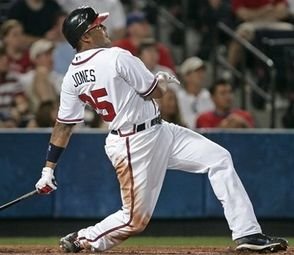An era that might never come again
The question of what pitching coach Leo Mazzone actually meant to the Atlanta Braves might never be answered to the complete satisfaction of WHIP-crunching seamheads everywhere. Whether Bobby Cox is a gruff but fair manager of men or a sort of gradually worsening old coot in a uniform sometimes stacks up as one of life's basic imponderables.
"Seamhead?" For those who don't know, seamhead is the newest slam on sabermetrics by people who don't have enough of a brain to understand that the numbers being used are not, as the definition implies, obscure. To even join WHIP and "seamhead" shows how moronic and biased Mark Kreidler is. WHIP is so common that it is usually reported by any media source online, including ESPN. It is a fixture of fantasy sports now. Rather than using a word that Google won't automatically define, maybe you should understand what obscurity actually is, Marky. Hmmmk?
Oh, sure, that was a while ago -- eons, by the modern standard. Since Mazzone took his pitching theories with him to Baltimore after the 2005 season, for example, the Braves have experienced back-to-back third-places finishes in the N.L. East, going a combined 163-161 over two years.
Hyperbole is not your friend, Mark. "Eons" by whose "modern standard?" Dumbass. Yes, the Braves have not been a playoff team in two years since Mazzone left. The implication here is that Mazzone, if not causing it, played a major role.
Of course, in the AL with Leo, the Orioles have seen no improvement and have finished 13th out of 14 AL teams in consecutive years. It ain't easy facing the Yankees and Red Sox offense a disapportionate amount of times, I realize, but for the great pitching mind, Leo has not provided much to his new team.
Moral of the story? Hall of Fame pitchers are good. Without them, it's much, MUCH harder.
What's this? Mark's going to just repeat what I said. Oh, I hope my popcorn is ready.
The easy response to the success of those years is to survey the careers of Tom Glavine, John Smoltz and Greg Maddux, among others, and essentially credit their bosses with being in the right place at the right time. Smoltz has been particularly insightful on the subject of Mazzone, gently pointing out in a recent interview with the Atlanta Journal Constitution that Mazzone's reputation as a pitching-staff wizard was built substantially on his ability to handle pitchers who already knew how to compete at the major-league level.
That's probably fair as far as it goes, and it's no problem accepting such a notion when you consider that Mazzone's two years in Baltimore, where the Orioles have been beset by injury and basic organizational and personnel failures, have produced the 29th-ranked pitching staff in the majors for two seasons running.
But the whole story? Egad, no. The whole story in Atlanta is too complex for that. It goes to something more mysterious and ethereal and, thus, of severely limited value in baseball's statistics-oriented society. It goes to the idea of multiple minds working together in some sort of weird harmony, of organizational leaders being pretty comfortably in sync. You probably can see it more easily than explain it.
I should have said 29th worst pitching staff in the majors, I guess. Sounds more notable. But hey, I thought it would be fun to keep it to the AL. And yes, the Big Three, "among others," played a major role in the mystique and greatness or Leo, Bobby, and JS. First off, both Smoltz and Glavine were young pitchers who had some success before Leo's arrival. Then, Maddux didn't need much help. He was already the best pitcher in the majors when he joined Atlanta. In fact, the young pitching, especially the starters, who failed in Atlanta are a big blackmark on Leo's career.
Look at Odalis Perez and Jason Marquis, two of the better young arms in the game, and neither could reach any sort of potential with Leo. Now, they were probably overranked as prospects, but Leo was supposed to turn them into stars. He nearly wrecked Kevin Millwood with his idea of "I don't care how hard you can throw, do it like Tom Glavine." And who takes the blame for the sad failure of Steve Avery's promising career?
The actual statistical studies that have gone over best manager and best GM, Mark, actually come to the conclusion that stability and a solid working relationship is exceptionally important to a successful atmosphere.
It ended right after Mazzone left, although only a fool would suggest that any one person's absence caused the Braves to drop off to 79-83 in 2006 or to miss the playoffs again this year. Players get older, arms fade, rosters grow brittle, injuries happen -- it's the same story everywhere you go.
You seem to be suggesting just that, Mark.
Sunday, October 14, 2007
Subscribe to:
Post Comments (Atom)

No comments:
Post a Comment